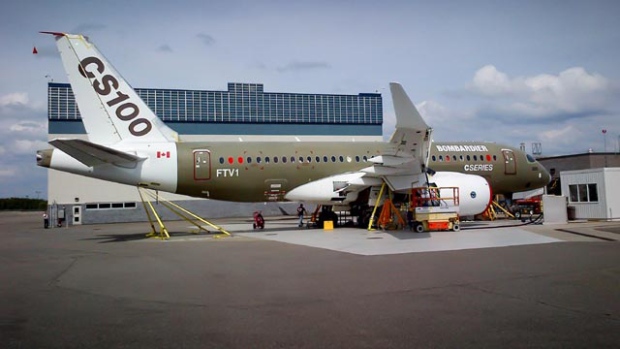Sep 27, 2016
Bombardier puts CSeries up for environmental scrutiny with aim of selling more aircraft
, The Globe and Mail

Bombardier Inc.(BBDb.TO) has become the first company in the aerospace industry to disclose the life-cycle environmental impact of one of its products, putting its C Series airliner up for scrutiny in a move it believes will help it sell more planes.
The Montreal-based aircraft maker said Monday that it published the sector’s first so-called environmental product declaration, an independently verified and registered document that outlines specific information about the environmental impact of a product over its life span.
The declaration doesn’t mean a product is necessarily greener than others. It is simply a declaration of its environmental impact that can be compared to other products using standardized measurements. EPD rules are overseen and administered by a secretariat located in Sweden.
Bombardier made the declaration for its CS100 airliner, an all-new 135-seat aircraft, during a forum in Montreal hosted by the United Nations’ International Civil Aviation Organization. Delegates from countries around the world are meeting over the next 11 days to try to hammer out a global accord limiting pollution from international flights. A deal has the backing from at least 60 nations including the United States and most of Europe, according to Bloomberg.
“This is really a culmination of a lot of effort from the very beginning of the program to create an aircraft that has less of an impact on the environment than airplanes before it,” Fred Cromer, president of Bombardier’s commercial aircraft unit, said in an interview.
“When I’m talking to potential customers about the environmental impact of the aircraft, now I can back that up with with a declaration that is provided by an independent source, reviewing what we say the impact is. So I think it’s extremely important to be able to have this.”
Two years late to market and more than $2-billion over budget, the 100- to 160-seat CSeries is the first clean-sheet design of a single-aisle airliner in nearly 30 years. Bombardier has 370 firm orders for the aircraft and more than 300 letters of intent and memorandums of understanding that could become orders. Marquee customers include Delta Air Lines, Air Canada and Korean Air.
Mr. Cromer said investors should expect the company to announce one or more additional orders for CSeries aircraft by the end of the year.
An order could give a boost to Bombardier’s stock price, which has declined in each of the past seven trading sessions. It closed Monday at $1.58, its lowest level since April, as investors fret over another possible production cut to the company’s Global business jets, its highest-margin aircraft.
There is also anxiety about CSeries deliveries. Bombardier said last month that it would only ship out seven CSeries planes this year, roughly half the previously-expected number, as its engine supplier Pratt & Whitney sorts out production issues.
“We have all the confidence in the world that Pratt is going to resolve this situation soon,” Mr. Cromer said. “Ultimately I think it’ll be a short-term issue and we’ll get past it.”
Standard & Poor’s cited the CSeries delivery cuts, together with softer demand for business and commercial jets generally, in downgrading Bombardier’s debt deeper into speculative territory last week. The ratings company lowered the credit rating to B-minus from B, just one notch above the triple-C ratings signalling an extremely speculative investment.
Quebec Premier Philippe Couillard played down the downgrade as it relates to the long-term prospects of the CSeries, saying Monday the delivery situation amounts to a “circumstantial” problem that doesn’t call into question the quality of the aircraft.
Bombardier is marketing the CSeries as the greenest single-aisle aircraft in its class, a plane that has “radically reduced emissions.” The company says that over its lifespan, each CSeries plane will reduce the amount of carbon dioxide emissions released into the atmosphere by up to 120,000 tonnes compared to other similarly-sized airliners. It says that is equivalent to taking about 32,000 mid-sized cars off the road for a year.




